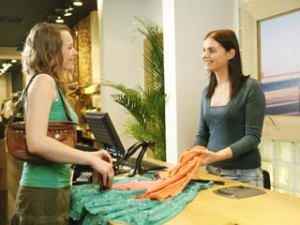Counter and Retail Clerks
 Counter and retail clerks work as intermediaries between the general public and businesses that provide goods and services. They take orders and receive payments for such services as videotape and DVD rentals, automobile rentals, and laundry and dry cleaning. They often assist customers with their purchasing or rental decisions, especially when sales personnel are not available. These workers might also prepare billing statements, keep records of receipts and sales, and balance money in their cash registers. There are more than 451,000 counter and retail clerks working in the United States.
Counter and retail clerks work as intermediaries between the general public and businesses that provide goods and services. They take orders and receive payments for such services as videotape and DVD rentals, automobile rentals, and laundry and dry cleaning. They often assist customers with their purchasing or rental decisions, especially when sales personnel are not available. These workers might also prepare billing statements, keep records of receipts and sales, and balance money in their cash registers. There are more than 451,000 counter and retail clerks working in the United States.
Counter and Retail Clerks Job Description
Job duties vary depending on the type of business. In a shoe repair shop, for example, the clerk receives the shoes to be repaired or cleaned from the customer, examines the shoes, gives a price quote and a receipt to the customer, and then sends the shoes to the work department for the necessary repairs or cleaning. The shoes are marked with a tag specifying what work needs to be done and to whom the shoes belong. After the work is completed, the clerk returns the shoes to the customer and collects payment.
In stores where customers rent equipment or merchandise, clerks prepare rental forms and quote rates to customers. The clerks answer customer questions about the operation of the equipment. They often take a deposit to cover any accidents or possible damage. Clerks also check the equipment to be certain it is in good working order and make minor adjustments, if necessary. With long-term rentals, such as storage-facility rentals, clerks notify the customers when the rental period is about to expire and when the rent is overdue. Video-rental clerks greet customers, check out DVDs or tapes, and accept payment. Upon return of the DVDs or tapes, the clerks check the condition of the DVDs or tapes and then put them back on the shelves.
In smaller shops with no sales personnel or in situations when the sales personnel are unavailable, counter and retail clerks assist customers with purchases or rentals by demonstrating the merchandise, answering customers’ questions, accepting payment, recording sales, and wrapping the purchases or arranging for their delivery.
In addition to these duties, clerks sometimes prepare billing statements to be sent to customers. They might keep records of receipts and sales throughout the day and balance the money in their registers when their work shift ends. They sometimes are responsible for the display and presentation of products in their store. In supermarkets and grocery stores, clerks stock shelves and bag food purchases for the customers.
Service-establishment attendants work in various types of businesses, such as a laundry, where attendants take clothes to be cleaned or repaired and write down the customer’s name and address. Watch-and-clock-repair clerks receive clocks and watches for repair and examine the timepieces to estimate repair costs. They might make minor repairs, such as replacing a watchband; otherwise, the timepiece is forwarded to the repair shop with a description of needed repairs.
Many clerks have job titles that describe what they do and where they work. These include laundry-pricing clerks, photo-finishing-counter clerks, tool-and-equipment- rental clerks, airplane-charter clerks, baby-stroller and wheelchair-rental clerks, storage-facility-rental clerks, boat-rental clerks, hospital-television-rental clerks, trailer-rental clerks, automobile-rental clerks, furstorage clerks, and self-service-laundry and dry-cleaning attendants.
Browse all Marketing Careers.
